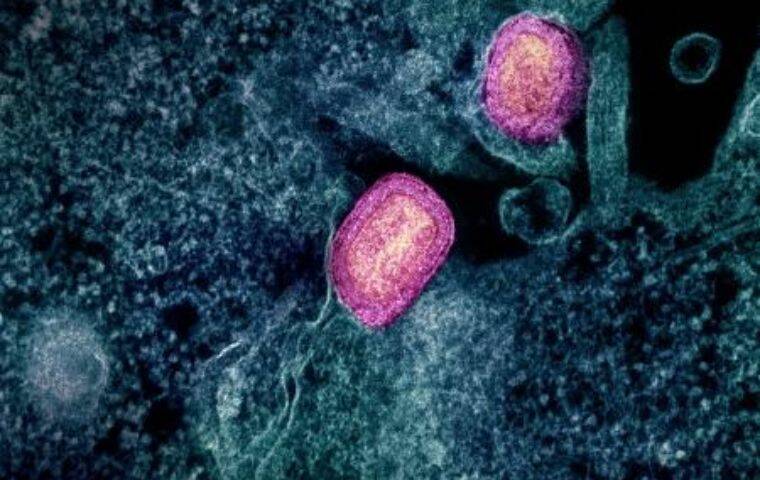WHO declares global emergency over new mpox outbreak

NATIONAL INSTITUTE OF ALLERGY AND INFECTIOUS DISEASES
Colorized transmission electron micrograph of two mature mpox virus particles (pink) attached to the surface of an infected VERO E6 cell (blue/teal). Image captured at the NIAID Integrated Research Facility in Fort Detrick, Maryland. The rapid spread of mpox, formerly called monkeypox, in African countries constitutes a global health emergency, the World Health Organization declared today.
The rapid spread of mpox, formerly called monkeypox, in African countries constitutes a global health emergency, the World Health Organization declared today.
This is the second time in three years that the WHO has designated an mpox epidemic as a global emergency. It previously did so in July 2022. That outbreak went on to affect nearly 100,000 people, primarily gay and bisexual men, in 116 countries and killed about 200 people.
The threat this time is deadlier. Since the beginning of this year, Congo alone has reported more than 14,000 mpox cases and 524 deaths. Those most at risk include women and children under 15.
“The detection and rapid spread of a new clade of mpox in eastern DRC, its detection in neighboring countries that had not previously reported mpox, and the potential for further spread within Africa and beyond is very worrying,” said Dr. Tedros Adhanom Ghebreyesus, the WHO’s director-general.
The outbreak has spread through 13 countries in Africa, including a few that had never reported mpox cases before. On Tuesday, the Africa Centers for Disease Control and Prevention declared a “public health emergency of continental security,” the first time the organization has taken that step since the African Union granted it the power to do so last year.
“It’s in the interests of the countries, of the continent and of the world to get our arms around us and stop transmission as soon as we can,” said Dr. Nicole Lurie, executive director for preparedness and response at the Coalition for Epidemic Preparedness Innovations, a nonprofit that finances vaccine development.
Don't miss out on what's happening!
Stay in touch with breaking news, as it happens, conveniently in your email inbox. It's FREE!
The WHO’s designation of a “public health emergency of international concern” is intended to prompt member countries to begin preparing for the virus’s appearance and to share vaccines, treatments and other key resources with poorer nations.
“We need concerted international action to stem this recent, novel outbreak,” said Gregg Gonsalves, an epidemiologist at Yale University.
The version of mpox that has been circulating in Congo has always been more virulent and currently has a death rate of about 3%, compared with 0.2% in the 2022 outbreak. The infection can produce fever, respiratory symptoms, muscle aches and swollen lymph nodes, as well a rash on the hands, feet, chest, mouth or genitals.
This article originally appeared in The New York Times.
© 2024 The New York Times Company

 Holy Week & Easter in Aiea || Free Events for All at OSHi! ️️
Holy Week & Easter in Aiea || Free Events for All at OSHi! ️️

